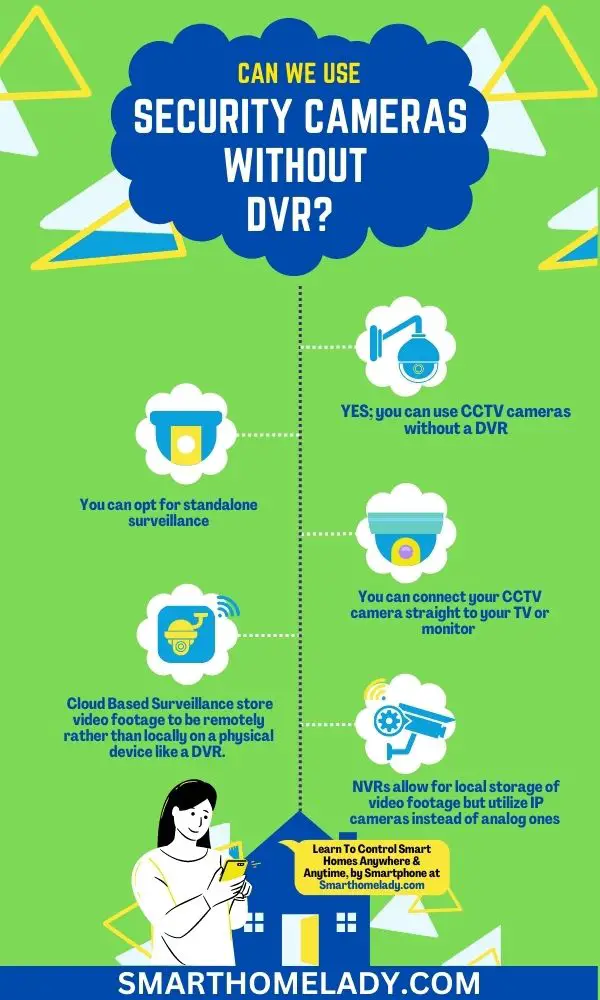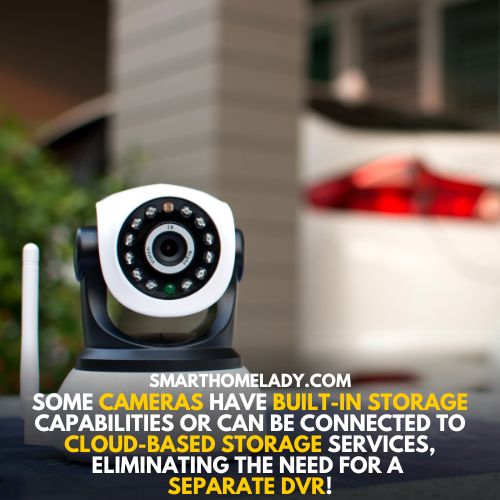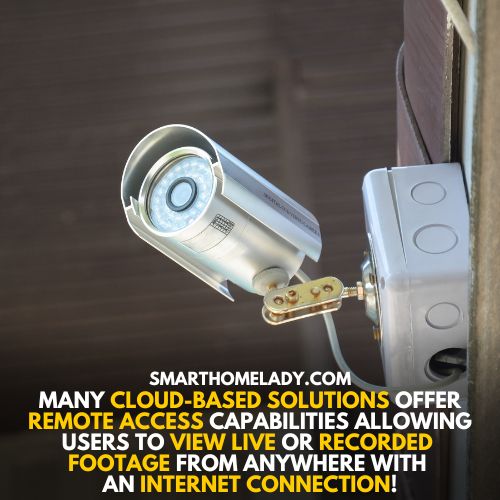When it comes to security surveillance, CCTV cameras are the go-to option for many businesses and homeowners. However, one common question often arises is, “Can we use CCTV camera without DVR?”
The short answer to this question is YES; you can use CCTV cameras without a DVR, but it might not be the best option for your security needs.
A DVR or Digital Video Recorder is an essential component of a CCTV system that records and stores video footage captured by the cameras. Without DVR, you’ll only be able to watch your live feed. If you want to record your camera’s feed then DVR is a must.
In fact, several alternative options can provide similar functionality without the added expense of purchasing and maintaining a separate recording device.
In this article, we will explore some of these alternatives and discuss their pros and cons to help you decide which solution is best for your security needs.

Contents
- 1 How To Install CCTV Camera Without DVR – 3 Ways
- 2 Is DVR Necessary For CCTV?
- 3 Understanding The Role Of A DVR In CCTV Camera Systems
- 4 Alternative Of DVR – Cloud-Based Surveillance Options
- 5 Network Video Recorders (NVRs) as An Alternative
- 6 Hybrid Solutions
- 7 Do All cameras need a DVR?
- 8 Can I connect CCTV camera directly to TV?
- 9 Does CCTV work without data?
- 10 Can CCTV record if DVR is off?
- 11 Which is better DVR or NVR?
- 12 Conclusion
How To Install CCTV Camera Without DVR – 3 Ways
If you don’t want to use DVR with your CCTV camera, then there are some ways to use it without it. Let me share with you some ways to make it happen.
- Firstly, you can opt for standalone surveillance. IP cameras can function independently, like security cameras equipped with SD cards. This means you can still keep an eye on things without necessarily investing in a DVR.
Suggested Readings
- Beginners Guide To Security Cameras
- What Causes Video Loss In Security Cameras?
- Where Do Security Cameras Store Data?
- Why Do My Security Cameras Go Black?
- CCTV Camera Showing Black Screen
- Secondly, you can connect your CCTV camera straight to your TV or monitor with an RCA or HDMI cable. It is a simple process. All you need to do is plug in the RCA cable or HDMI cable into your camera and then connect it to your TV or monitor. With this setup, you’ll be able to view your footage without any delays or interruptions.
- When looking for a camera, it’s important to consider whether or not it can save footage. Some cameras may not have this capability or may require additional hardware to do so. So, if you want cameras that work without DVR, look for cameras with no footage saving.
Remember: When it comes to security surveillance, having a CCTV camera without a Digital Video Recorder (DVR) might seem like an incomplete setup. It’s comparable to owning a car without fuel – it won’t be able to function properly.
Is DVR Necessary For CCTV?
No, DVR (Digital Video Recorder) is not necessary for all CCTV security cameras, but it can be useful in certain situations. DVRs allow for the storage of video footage and provide the ability to search and review recorded footage.
Without a DVR, the camera may only be capable of live streaming and not recording. However, some cameras have built-in storage capabilities or can be connected to cloud-based storage services, eliminating the need for a separate DVR.

Ultimately, whether or not a DVR is necessary depends on the user’s specific needs and goals and the camera’s capabilities.
Understanding The Role Of A DVR In CCTV Camera Systems
As the famous saying goes, ‘A picture is worth a thousand words.’ This statement holds true for security surveillance systems.
CCTV cameras have become an integral part of securing homes and businesses alike. While traditional setups include a DVR (Digital Video Recorder), there are alternatives available in the market now.
Standalone cameras can also capture footage without the need for a DVR. These devices have built-in storage capabilities to hold recordings for later viewing or live streaming.
They come in different shapes and sizes, making them suitable for various settings such as indoor/outdoor use, discreet monitoring, etc.
However, it’s important to note that standalone cameras may not provide all the features and benefits offered by a full-blown CCTV system with a DVR.
So, here are some other alternatives to DVR.
Alternative Of DVR – Cloud-Based Surveillance Options
There are alternatives to using a DVR that may be more suitable depending on the specific needs of your surveillance system.
One option is utilizing cloud-based surveillance options, which allow for video footage to be stored remotely rather than locally on a physical device like a DVR. This can provide added security as footage cannot be destroyed or tampered with if the physical device is damaged or stolen.
Additionally, many cloud-based solutions offer remote access capabilities allowing users to view live or recorded footage from anywhere with an internet connection.

The downside to this approach is that it requires consistent and reliable internet connectivity, which may not always be available in certain locations.
Pros And Cons Of Cloud-Based Surveillance Options As An Alternative To DVR
| Pros | Cons |
|---|---|
| Cost-effective | Requires internet connection |
| Scalable | Data security concerns |
| Accessible from anywhere | Limited storage capacity |
| Easy to set up | Dependence on third-party providers |
| Automatic software updates | Potential for service interruptions |
| Remote monitoring | Limited customization options |
| Integration with other cloud services | Limited control over data management |
| Redundancy and disaster recovery | Dependence on internet speed and reliability |
Suggested Readings
- Can Security Cameras See Smoke?
- How Far Can Security Cameras See At Night?
- Can Security Cameras See Inside Cars?
- Why Do Security Cameras Have Green Lights?
- How Far Can Security Cameras See?
Network Video Recorders (NVRs) as An Alternative
Moving away from cloud-based solutions, network video recorders (NVRs) is another alternative.
Like DVRs, NVRs allow for local storage of video footage but utilize IP cameras instead of analog ones used by traditional DVRs. This provides higher-resolution footage and greater flexibility in terms of placement due to wireless functionality.
Many NVRs also offer remote access capabilities similar to those found in cloud-based solutions. One advantage of NVRs over DVRs is their flexibility in terms of storage options.
Pros And Cons Of NVRs Over DVR
| Pros of NVRs | Cons of NVRs |
|---|---|
| Higher resolution support | More expensive than DVRs |
| Easier remote access and management | Requires a strong network connection |
| More reliable storage options | Limited compatibility with analog cameras |
| Enhanced scalability and flexibility | May require additional software or hardware |
| Better integration with IP cameras | More complex setup and configuration |
With NVRs, you have the choice between using built-in hard drives or cloud-based storage solutions, depending on your needs and budget. This means you can record as much footage as you need without worrying about running out of space or losing important data due to hardware malfunctions.
Hybrid Solutions
CCTV cameras could be used without DVRs, but you need to keep some limitations and considerations in mind.
Wired alternatives such as IP cameras can be connected directly to your network and accessed through an NVR (network video recorder) or VMS (video management software). This allows for remote viewing and recording capabilities without the need for a physical DVR.
Similarly, wireless options like Wi-Fi cameras can also transmit footage directly to your mobile device or computer with the help of appropriate apps or software.
However, it’s important to note that both wired and wireless alternatives may require additional equipment and setup costs compared to traditional DVR systems.
Suggested Readings
- Do Home Security Cameras Use A lot Of Electricity?
- Security Cameras That Work When Power Goes Out
- Can Security Cameras See In The Dark?
- Can Security Cameras Be Jammed?
- Can You Use Any DVR With Security Cameras?
Frequently Asked Questions FAQs
Do All cameras need a DVR?
Not all cameras need a DVR, as it depends on the purpose and usage of the camera. Some cameras are designed for live streaming and do not require a DVR to record footage.
For example, a security camera installed in a store or office may require a DVR to record footage for later review. On the other hand, a baby monitor camera may not require a DVR as it is used for live monitoring of the baby’s activities.
Additionally, some cameras may have built-in storage options such as memory cards or cloud storage, eliminating the need for a DVR.
Furthermore, some cameras are designed to be used with a separate recording device, such as a camcorder. These cameras may not require a DVR as the footage is recorded directly onto the camcorder.
Can I connect CCTV camera directly to TV?
Yes, you can connect a CCTV camera directly to a TV using a BNC cable or an RCA cable. This is called a direct connection, and it allows you to view the live video feed from the camera on your TV screen.
However, without a DVR, you won’t be able to record or store the footage.
Does CCTV work without data?
Yes, CCTV can work without data. CCTV cameras can be connected to a local network or a standalone DVR, which can store the footage locally. This means that you don’t need an internet connection to use CCTV, and you can still have a reliable surveillance system in place.
Can CCTV record if DVR is off?
No, CCTV cannot record if the DVR is off. The DVR is the device that records and stores the footage from the CCTV cameras. If the DVR is turned off, recording or saving the footage is impossible.
It’s important to ensure that the DVR is always on and functioning properly to ensure the CCTV system works effectively.
Which is better DVR or NVR?
It depends on your specific needs and budget. DVR (Digital Video Recorder) systems are generally less expensive than NVR (Network Video Recorder) systems, and they are better suited for small to medium-sized businesses.
NVR systems, on the other hand, are better suited for larger businesses or organizations that require high-resolution video and advanced features such as remote access and analytics.
NVR systems use IP (Internet Protocol) cameras, which are more expensive than analog cameras used with DVR systems.
Ultimately, the decision between DVR and NVR depends on the specific requirements of your surveillance system.
Conclusion
In conclusion, CCTV cameras can be used without a DVR, but it depends on your specific needs and budget. A standalone CCTV camera will suffice if you only need live monitoring without recording.
However, if you want to record and review footage, then a DVR is essential. It’s important to weigh each option’s pros and cons before deciding.
Don’t hesitate to consult a professional to help you make an informed choice. So, make the right decision and secure your surroundings today.



“Insightful post! The breakdown of three ways to use CCTV cameras without a DVR is incredibly helpful. Understanding alternative setups for surveillance is crucial, and your explanations make it accessible for all readers. Thanks for shedding light on this topic and providing practical solutions!”